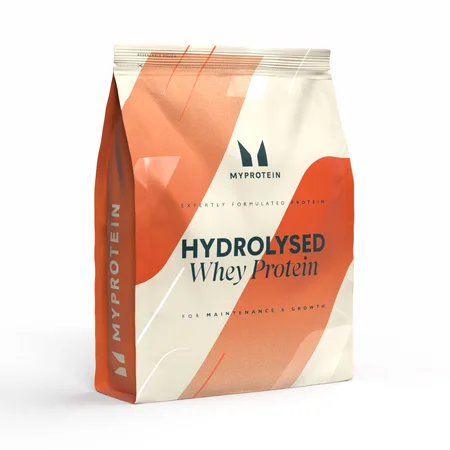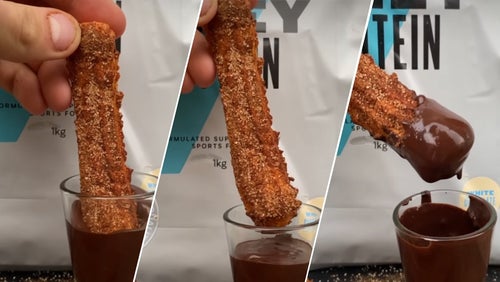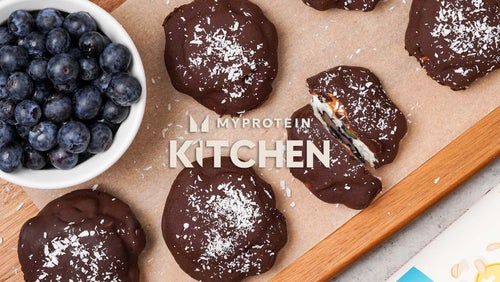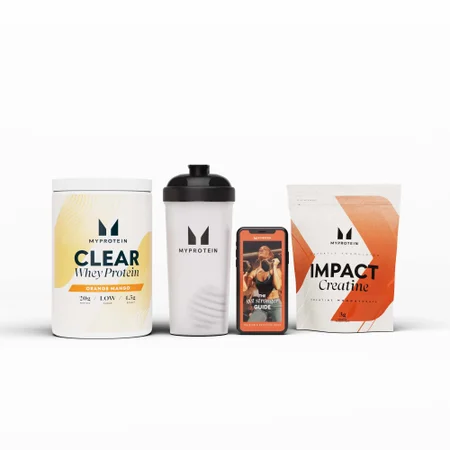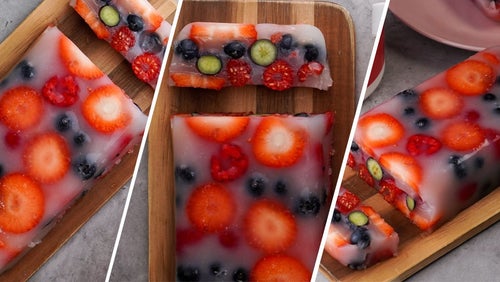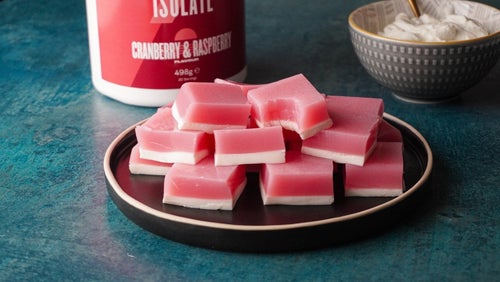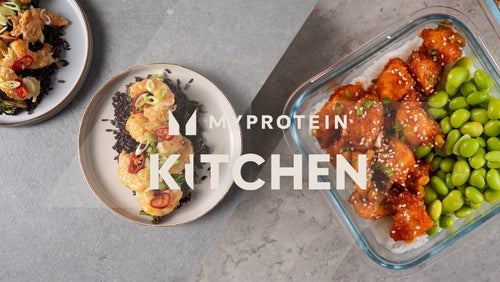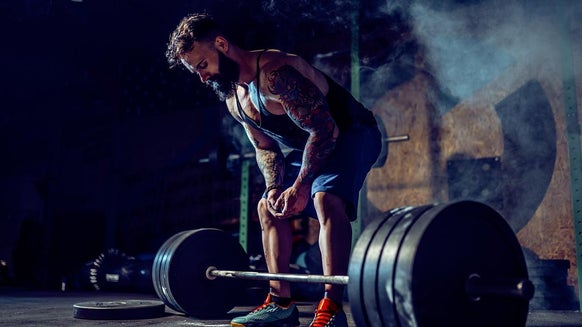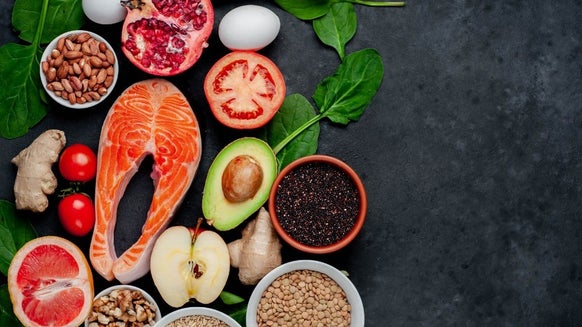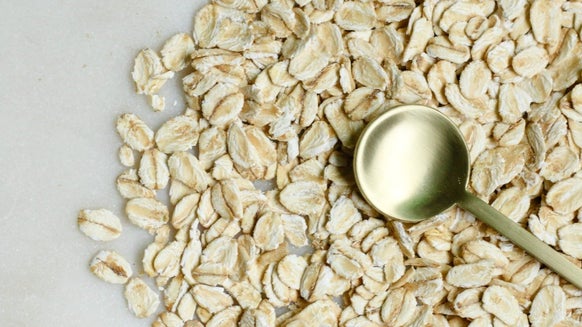34 Delicious Whey Protein Recipes Absolutely Worth Trying

These tasty whey protein recipes will quickly become your go-tos for packing in both great macros and flavour.
You can do way more with whey protein than just down it after your workout, though I'm not judging anyone for doing just that. You just might wanna spice things up a little.
From tasty desserts to quick snacks and shakes, these are our top 34 whey protein recipes guaranteed to make your tastebuds happy and help keep your progress in the gym on track.
- What is whey protein
- Whey protein breakfast recipes
- Whey protein snack recipes
- Whey protein pre-workout recipes
- Whey protein dessert recipes
- Whey protein ice cream recipes
- Clear Whey Protein recipes
What is whey protein?
Before we get into it, let’s unpack whey protein for a minute. Whey is a byproduct of the cheese production process that has been repurposed to be used in protein powders. There’s a variety of different whey protein types, from concentrate, to isolate, to hydrolysate — any of which can be used in the following recipes.
Whey protein breakfast recipes
Whether you’re trying to build muscle, or just live an active lifestyle, having a high-protein breakfast is important. In order for your body to function properly, it’s important to eat protein at regular intervals throughout the day.
Starting the day with 20-30g of protein will not only promote muscle protein synthesis, but it will also help keep you full until it’s snack or lunch time.
1. High-protein cinnamon baked oat cake
Cake for breakfast? OK, silly question.
This fluffy cinnamon baked oat cake is topped with an indulgent cream-cheese glaze that’s guaranteed to start your day off on the right foot. 33g of protein and 332 calories, I can’t wait to give this one a go.
| Calories | Protein | Carbs | Fat |
| 332 | 33g | 35g | 8g |
2. Salted caramel overnight wheat biscuits
After seeing this breakfast idea take over TikTok, we couldn’t resist making our own.
This salted caramel overnight Weetabix recipe couldn’t be simpler, and it delivers a massive 54g of protein. Perfect for anyone who prefers a sweet breakfast over savoury.

Salted Caramel Overnight Weetabix | High-Protein Breakfast
A sweet protein hit to start your day right.
| Calories | Protein | Carbs | Fat |
| 480 | 54g | 50g | 5g |
3. Frozen protein pancake meal prep
OK, sometimes pancakes in the morning feels like a bit of a mission. But what if we told you it doesn't have to be that way... That's right, this recipe transforms protein pancakes into an easy, 5 minute breakfast.
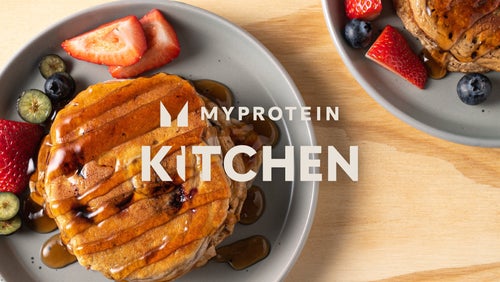
Frozen Protein Pancake Meal Prep
Transform your morning routine in a matter of minutes.
| Calories | Protein | Carbs | Fat |
| 416 | 41g | 51g | 6g |
4. High-protein cookie cereal
OK, OK, this recipe may have been intended for Valentine's Day, but who says you can’t make yourself heart-shaped cereal any day of the year?
This breakfast option couldn't be more adorable, and it delivers 11g per serving. For anyone who wants to start the day in style.

Valentine’s Day High-Protein Cookie Cereal
These are the cutest little cookies to spread some love.
| Calories | Protein | Carbs | Fat |
| 289 | 11g | 29g | 14g |
5. 4-Ingredient banana protein pancakes
This ridiculously easy, foolproof recipe will become your go-to breakfast pancakes recipe (and maybe even lunch and dinner).
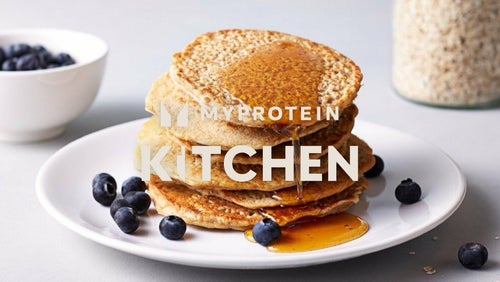
4-Ingredient Foolproof Banana Protein Pancakes
Make the perfect pancakes, even if you're a rookie.
| Calories | Protein | Carbs | Fat |
| 115 | 15g | 14g | 1g |
6. Sheet pan protein pancakes
Who said that you’ve gotta get the frying pan out to make pancakes? Because it wasn’t us.
In fact, we’re huge advocates for making life as easy as possible — enter, sheet pan pancakes. Pour your pancake mixture onto a baking sheet, pop it in the oven for 15 minutes, and as soon as you’ve prepped your toppings, it’s time to eat.
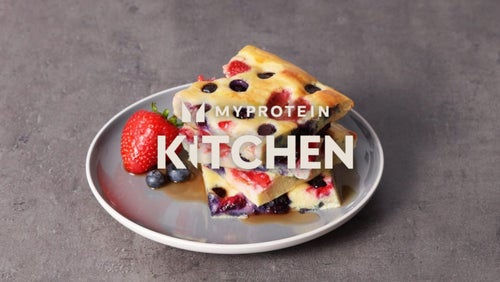
Sheet Pan Protein Pancakes | Easy Make-Ahead Breakfast
Forget flipping, this recipe takes all the work out of getting a perfect stack of pancakes.
| Calories | Protein | Carbs | Fat |
| 169 | 13g | 22g | 3g |
7. High-protein blueberry oat muffins
Muffins are always a good idea, especially when they’re filled with blueberries. And you certainly won’t catch me complaining about muffins for breakfast.
| Calories | Protein | Carbs | Fat |
| 197 | 11g | 25g | 5g |
8. 5-Ingredient high-protein breakfast tiramisu
Simplicity is key, especially at breakfast time. This tiramisu might look complex, but that’s the beauty of it, it’s so easy. Whip it up the night before and tuck in at breakfast time — it’s the only way to start the day.

5-Ingredient High-Protein Breakfast Tiramisu
Who says you can’t have dessert for breakfast?
| Calories | Protein | Carbs | Fat |
| 395 | 27g | 41g | 12g |
9. Air fryer choco pops
Whether you're 8, 22, or 35, the craving for a super chocolatey bowl of cereal never really goes away. Only these days it’s protein cereal, not your childhood favourite.

Air Fryer Choco Pops
Your favourite childhood cereal just got a macro-friendly makeover.
| Calories | Protein | Carbs | Fat |
| 275 | 14g | 34g | 8g |
Whey protein snack recipes
There’s plenty of information out there on the importance of nutritious meals, but information on healthy snacks is few and far between.
Snacks are essentially mini meals to keep us going until our larger meals. So it’s just as important that we fuel our body well through our snacks as well as our main meals.
Plus, if you’re working to might a high daily protein goal, snacks are the perfect way to boost your intake.
10. 3-Ingredient high-protein fudge
We’re starting off strong with this high-protein fudge from @fitwaffle. The perfect indulgent treat to satisfy that sweet tooth and support those gains. 16g of protein per serving and an ooey-gooey fudge texture, need I say more?
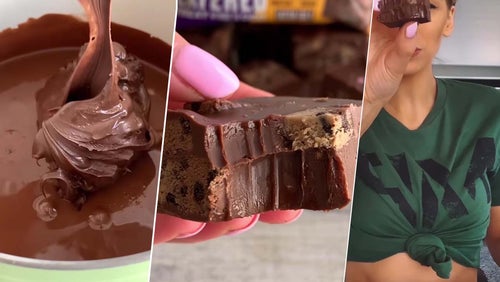
3-Ingredient Protein Fudge
Chocolatey, fudgey goodness that packs a protein punch.
| Calories | Protein | Carbs | Fat |
| 304 | 16g | 18g | 19g |
11. Protein churros
If you’re unfamiliar with churros, firstly, I’m sorry, secondly, they’re a type of fried dough, usually covered in sugar and dipped in chocolate or caramel sauce.
While they aren’t usually that macro friendly, Zac Kerr (@counting_zacros) has been doing the Lord’s work and created a recipe that delivers in the macro department.
6g of protein and just 49 calories per churro. Sign me up.
| Calories | Protein | Carbs | Fat |
| 49 | 6g | 5g | 0.3g |
12. Simple protein chocolate flapjacks
Flapjacks might often be thought of as a childhood recipe, but Kirsty Fletcher (@kirstyfletcher_) has given me reason to make them once again with this recipe.
These flapjacks are enrobed with protein chocolate (made with whey) and deliver 8g of protein and just 180 calories per portion. Win.
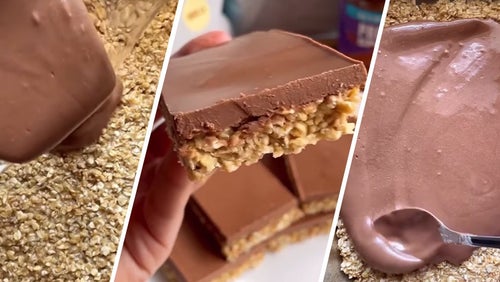
Simple Protein Chocolate Flapjacks
Post-workout, mid-morning, or before bed. Every occasion is just right for a protein flapjack.
| Calories | Protein | Carbs | Fat |
| 140 | 8g | 18g | 4g |
13. Blueberry protein yoghurt clusters
130kcal and 9g of protein per cluster, these are a win. Refreshing yoghurt topped with peanut butter and enrobed in a thick layer of chocolate. Need we say more?
| Calories | Protein | Carbs | Fat |
| 130 | 9g | 10g | 7g |
14. NYC style choc chip cookies
Chocolatey, gooey and super chunky — exactly how cookies should be. For an extra treat, chuck some white chocolate chips in with the dark chocolate. Trust me, you won't regret it.

NYC Style Choc Chip Cookies
Come on, we know you like your cookies chunky.
| Calories | Protein | Carbs | Fat |
| 298 | 11g | 17g | 19g |
15. Ultimate cookie brownie recipe
Affectionately coined the “brookie”, a combination of two of the finest snacks there are. You guessed it, cookies and brownies.
Now that’s a snack time showstopper.
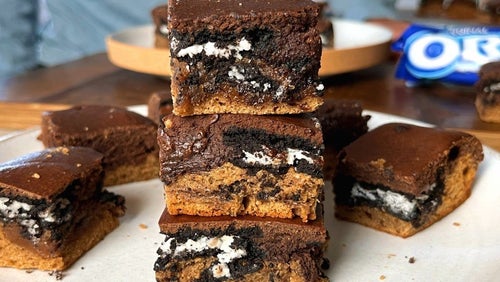
Ultimate Cookie Brownie Recipe
If we were entering Bake Off, this would be our showstopper.
| Calories | Protein | Carbs | Fat |
| 202 | 7g | 24g | 8g |
16. Fudgey avocado brownies
Ordinarily I like to enjoy my avocados on a slice of toast. But that was before I discovered avocado brownies. Using avocado instead of butter ensures you’ll get that gooeyness that every brownie needs, but they’re low in saturated fat and full of healthy fats.
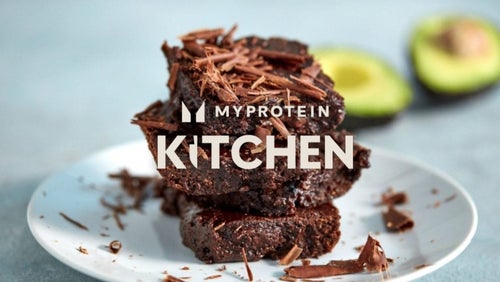
Fudgey One-Bowl Protein Brownies
So gooey, you’ll forget they’re actually good for you.
| Calories | Protein | Carbs | Fat |
| 151 | 7g | 12g | 8g |
17. High-protein white chocolate peanut butter cups
Using just four store cupboard ingredients, these peanut butter cups couldn’t be easier to pull together. The perfect snack to support your goals, while also satisfying your sweet tooth.

High-Protein White Chocolate Peanut Butter Cups
Creamy white chocolate with a rich, nutty centre. Yes, please.
| Calories | Protein | Carbs | Fat |
| 279 | 14g | 13g | 18g |
18. The ultimate high-protein cookie
This cookie is honestly as good as it looks. It’s packed full of chocolate, protein and smarties. Your 3pm pick-me-up has never tasted so good.
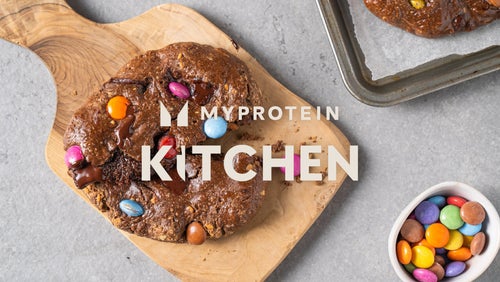
The Ultimate High-Protein Cookie
Now this is a protein hit worth your time.
| Calories | Protein | Carbs | Fat |
| 425 | 65g | 24g | 22g |
19. 1-Minute sticky toffee protein pudding
Two minutes is all it takes to pull together the easiest snack you’ve ever made. One minute for prep, one minute for baking (and maybe 30 seconds for it to cool down) and all that’s left is for you to wolf it down. That's snack time done right.
| Calories | Protein | Carbs | Fat |
| 126 | 24g | 2g | 2g |
Whey protein pre-workout recipes
A shake isn’t the only option for a pre-workout boost. A pre-workout snack is my personal favourite way to go. Not only do you get a boost of energy to get through the doors of the gym, but you also get to tide yourself over to your next meal.
Plus, if you prefer a late night gym session, you won't be loaded up on caffeine that'll keep you up all night.
20. High-protein chocolate orange energy balls
It’s 3pm, you’ve been staring at the clock and you’re not sure you’re going to have enough energy to make it to 5pm.
But then you remember you pre-made some chocolate orange energy balls, and all is well in the world.
No, but really, these energy balls are the perfect pick-me-up or pre-workout snack. 4.6g of protein per serving and covered in chocolate. Ideal.
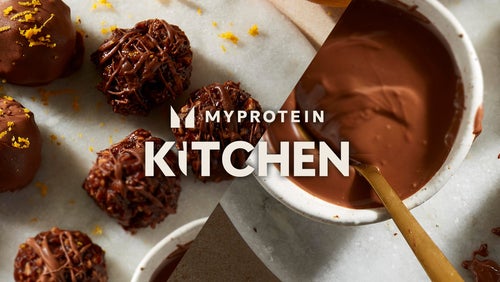
Chocolate Orange Energy Balls | Protein Plates Recipe Book
These treats are the tastiest way to power your training.
| Calories | Protein | Carbs | Fat |
| 198 | 6g | 17g | 12g |
21. Chocolate-stuffed banana muffins
Pre-workout doesn’t have to be a hurried shake on the way to the gym, it can be so much tastier, and these muffins are proof of that. Bananas are an excellent source of energy, providing you with the pre-workout boost you need, but without loads of added caffeine.
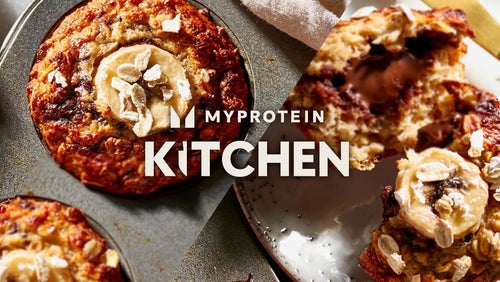
Pre-Workout Chocolate-Stuffed Banana Muffins | Protein Plates Recipe Book
Ooey, gooey and goal-fuelling.
| Calories | Protein | Carbs | Fat |
| 264 | 13g | 32g | 10g |
Whey protein dessert recipes
Dessert is the best time of the day, closely followed by snack time. Even if you’re trying to be strict on tracking your macros, it’s important that you still have some sweet treats to look forward to. Plus, if they boost your daily protein intake then it’s a win win.
22. New York protein cheesecake
This tasty New York protein cheesecake contains a fraction of the calories, fat and sugar of the classic but without skimping on the flavour.
| Calories | Protein | Carbs | Fat |
| 275 | 20g | 17g | 15g |
23. Sharing cookie dough
When it comes to desserts, it doesn’t get much better than cookie dough. Warm, gooey, and tasty. And this one is packed full of protein.
But let me warn you, no matter how good it smells, leave it to cool for at least five minutes. I learned that the hard way...
| Calories | Protein | Carbs | Fat |
| 363 | 27g | 16g | 20g |
24. High-protein sticky toffee pudding
Sticky toffee pudding has to be the greatest dessert. So, we did what we do best — added a scoop of Impact Whey to ensure its packing the macros and the flavour. And we succeeded.

High-Protein Sticky Toffee Pudding
Probably the most delicious way to boost your protein intake.
| Calories | Protein | Carbs | Fat |
| 344 | 17g | 55g | 4g |
25. Low calorie protein cheesecake
Whether you’re a rookie or a seasoned pro, this recipe is sure to wow anyone lucky enough to get a slice. And those macros are pretty impressive too. 25g of protein in a dessert — sign me up.
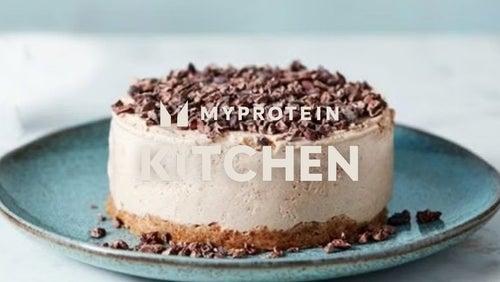
Protein Cheesecake Recipe | Low Calorie Cheesecake
A healthier twist on a classic dessert.
| Calories | Protein | Carbs | Fat |
| 180 | 25g | 10g | 4g |
Whey protein ice cream recipes
Ice cream plus protein — absolute dream team if you ask me. There’s no better post-workout treat than a protein-packed ice cream in the summer months. And don’t just take my word for it, load your freezer up with these goodies and tuck in after your sweatiest sessions.
26. Cottage cheese ice cream
Cottage cheese haters (we know you're out there) look away now. Everyone else, you need to try this recipe. 225kcal and 29g of protein, this is the ideal after-dinner sweet treat, and it couldn't be easier to make either. Once you've made your batch, stick it in the freezer and enjoy whenever you fancy.

High Protein Cottage Cheese Ice Cream
One spoon of this cottage cheese ice cream and you’ll know exactly why this recipe went viral. It really does speak for itself.
| Calories | Protein | Carbs | Fat |
| 225 | 29g | 16g | 4g |
27. High-protein ice cream sandwich
No matter the time of year, an ice cream sandwich is an elite dessert, and I won’t hear otherwise. It's a taste of summer all year round.
Creamy, crunchy, and so tasty — the perfect way to round off any meal.

High-Protein Ice Cream Sandwich
When it’s this hot, all snacks must feature ice cream. Those are the rules.
| Calories | Protein | Carbs | Fat |
| 195 | 10g | 21g | 8g |
28. 5-Ingredient protein mochi ice cream
A couple of years ago these little ice cream balls of goodness took the world by storm.
Mochi balls, a traditional Japanese sweet snack, are the perfect blend of Japanese rice cake (mochi) and ice cream to create a bite sized ice cream sandwich.
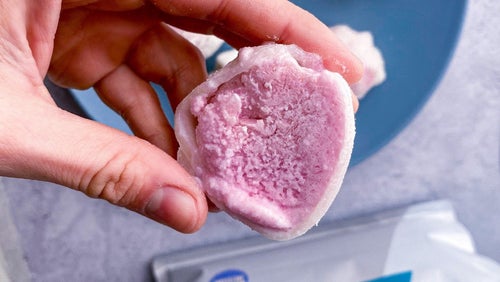
5-Ingredient Protein Mochi Ice Cream
Forget queuing round the block for your mochi ice cream fix, we’ve got the solution right here.
| Calories | Protein | Carbs | Fat |
| 206 | 8g | 34g | 4g |
29. Peanut butter ice cream lollies
I said it before, but I stand by it, so I'll say it again, peanut butter makes everything better. And these lollies are no exception.
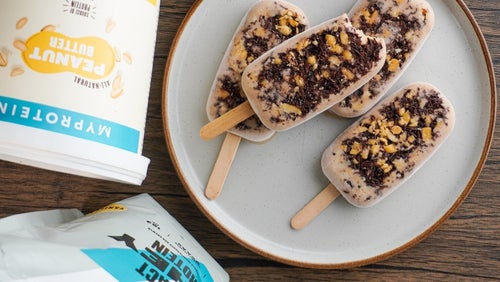
Tasty Peanut Butter Ice Cream Lollies
Cool down post-workout with this nutty treat.
| Calories | Protein | Carbs | Fat |
| 290 | 12g | 18g | 10g |
30. 30-Second protein ice cream
Made in just 30 seconds, cooling down after the gym has never been so easy (or so tasty).

Tasty 30-Second Protein Ice Cream & 9 Other Must-Try Recipes
All you'll need is a blender and few simple ingredients.
| Calories | Protein | Carbs | Fat |
| 148 | 13g | 18g | 3g |
Clear Whey Protein recipes
If you favour juice to a creamy shake, you’ll probably also prefer juicy recipes. Luckily for you, we’ve got those covered too.
31. 4-Ingredient Clear Whey fruit jelly
I simply had to include at least one Clear Whey recipe on this list. But don’t worry, we’ll also have a comprehensive list of clear protein recipes coming to the blog soon.
And this Clear Whey fruit jelly couldn’t be simpler. Perfect for summer and anyone who fancies a bit of nostalgia … this whole jelly provides 29g of protein and a whole lotta flavour.
| Calories | Protein | Carbs | Fat |
| 426 | 26g | 58g | 10g |
32. Vimto® Clear Whey gummy bears
Now it's time for some Clear Whey to cleanse the palette...
These Vimto® Clear Whey Gummy Bears are easier than you'd think, and they're the perfect treat without the cheat. And at just 65 calories and 15g of protein per serving, what more could you ask for?
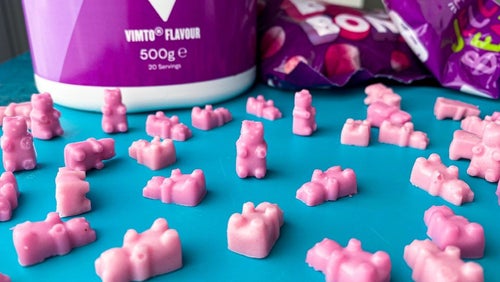
Vimto® Clear Whey Gummy Bears
| Calories | Protein | Carbs | Fat |
| 65 | 15g | 0g | 0g |
33. Clear Whey rainbow ice lollies recipe
We're all for incredible summer recipes, regardless of the time of year. This one is no exception.
Super simple and unbeatably refreshing, these ice lollies don't disappoint. Featuring 101 calories and 9.5g of protein, these are perfect for laying in the sun post-sweat sesh.

Clear Whey Rainbow Ice Lollies Recipe
Yep, we’re in denial about summer being over too.
| Calories | Protein | Carbs | Fat | |
| Tropical: | 101 | 9.5g | 12.9g | 1.3g |
| Berry: | 85 | 6g | 14.8g | 0.6g |
34. Clear Whey jelly sweets
Ok, these might look like soap, but stay with me. These are delicious.
Clear Whey Jelly Sweets are super simple to make, and will satisfy that sweet-tooth without any added sugar. And at just 18 calories and 3.5g of protein per sweet, you can much all day long.
| Calories | Protein | Carbs | Fat |
| 18 | 3g | 0g | 0g |

TRY THESE NEXT:
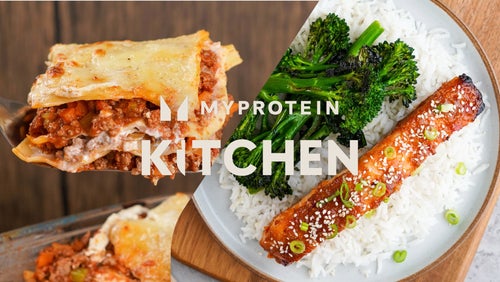
57 Meal Prep Recipes For Muscle Building & Fat Loss
Your next favourite prep is in here...

